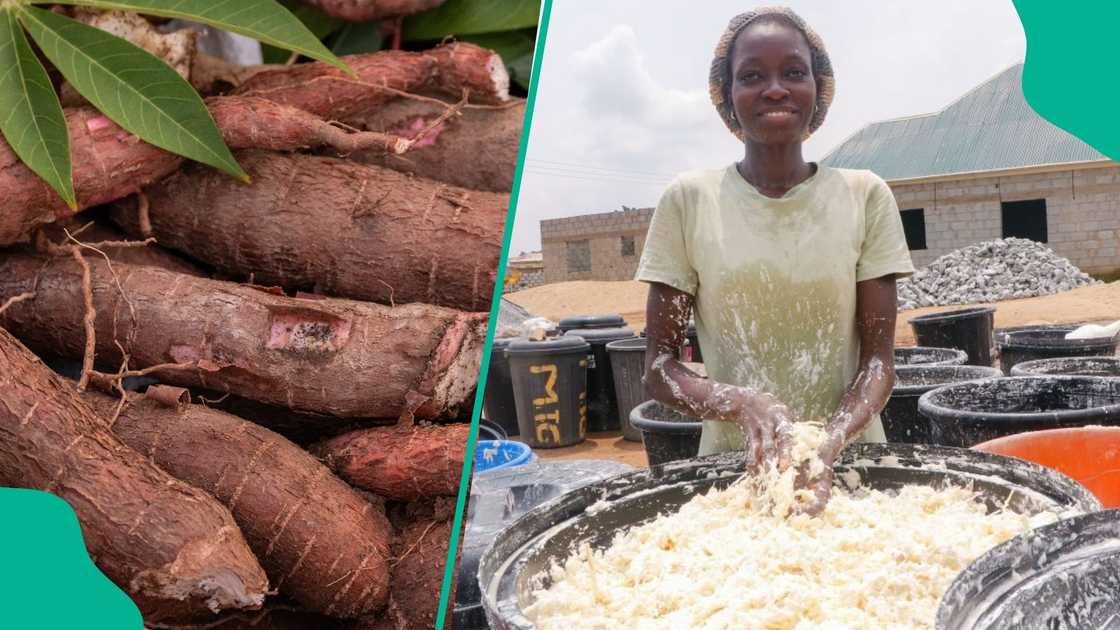How FG Plans to Drive Industrialisation of Cassava for Higher Value
- The Federal Government of Nigeria said it is committed to industrialising the cassava sector
- Nigeria is the largest producer of cassava in the world, but it exports most of it as a raw material
- African leaders admitted that there is enormous value in cassava industrialisation, and highlighted what must be done to harness it
The federal government has pledged its commitment to driving the industrialisation of cassava for finished products in Nigeria, Daily Trust reported.
The Secretary to the Government of the Federation (SGF), George Akume, said a policy is underway to convert cassava into high-value industrial and export products, rather than exporting it as a raw material.
According to a statement by the Ministry of Information and National Orientation, the pledge is in line with the Renewed Hope Agenda of President Bola Tinubu and the Presidential Executive Order 5.
Nigeria is the world’s largest producer of cassava and a major exporter to manufacturing hubs in Europe, Asia and the Americas.

Source: Getty Images
Akume, who was represented by Okokon Okon Etoabasi at the 2nd African Cassava Conference 2025 in Abuja, said cassava will play a major role in Nigeria’s industrialisation drive under the current administration.
He stressed that the government plans to scale up support for agribusiness and small-scale farmers who major in cassava production, for food security and industrial growth.
The SGF explained that the government is making plans to expand cassava processing into products such as starch, ethanol, flour and animal feed, by supporting cassava-based manufacturing.
He noted that Nigeria and Africa lose billions of dollars by exporting raw materials rather than finished goods.
Also speaking at the event, a representative of Prof. Pierre Demien Habumuremyi, former Prime Minister of Rwanda and Continental Chair of the Pan-African Alliance of Small and Medium Industries (PAOSMI), warned that Africa’s cassava sector will remain underdeveloped without significant investment in value addition, unless manufacturing is prioritised.
Habumuremyi urged African governments to convert cassava into industrial use, where its real value lies.
He said:
“Cassava sustains millions of households, but its full promise remains largely untouched. The industrial uses of cassava can be seen in the production of starch, ethanol, pharmaceuticals, biodegradable materials and animal feed, yet our value addition remains minimal.”
He said Africa faces such challenges as low productivity, post-harvest losses, limited processing capacity and weak quality standards.
Nigeria produces over 62 million tons of cassava
The Minister of Innovation, Science and Technology, Dr Kingsley Udeh, in his remarks, noted that Nigeria produces more than 62 million tonnes of cassava annually, making it the world’s largest producer.
He added that the crop already contributes to manufacturing, food processing, pharmaceuticals, biofuel production and exports.

Source: Getty Images
However, he argued that Nigeria’s and Africa’s contribution to the cassava value chain should not be in commodities only, but also through technology and precision agriculture.
He added that science and technology—such as biotechnology, precision agriculture and AI-driven crop monitoring—are essential for improving competitiveness across the cassava value chain.
“Tools such as AI-based crop monitoring, biotechnology, precision agriculture and advanced processing technologies are now essential for global competitiveness,” he said.
Cassava farmers record losses due to supply surplus
Legit.ng reported recently that cassava farmers recorded heavy losses due to a supply surplus in the market.
The excess supply was reportedly caused by severely low demand, forcing farmers to sell below market costs.
Stakeholders said buyers had turned to cheaper imported alternatives like corn starch, which was duty-free.
Proofreading by Funmilayo Aremu, copy editor at Legit.ng.
Source: Legit.ng





